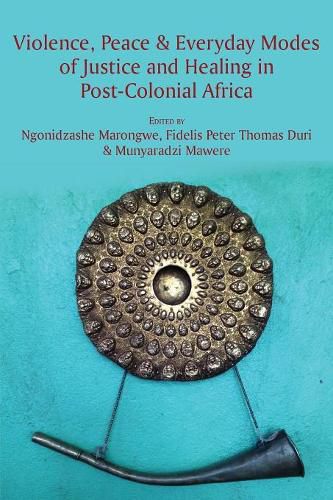Readings Newsletter
Become a Readings Member to make your shopping experience even easier.
Sign in or sign up for free!
You’re not far away from qualifying for FREE standard shipping within Australia
You’ve qualified for FREE standard shipping within Australia
The cart is loading…






This title is printed to order. This book may have been self-published. If so, we cannot guarantee the quality of the content. In the main most books will have gone through the editing process however some may not. We therefore suggest that you be aware of this before ordering this book. If in doubt check either the author or publisher’s details as we are unable to accept any returns unless they are faulty. Please contact us if you have any questions.
Violence in its various proportions, genres and manifestations has had an enduring historical legacy the world over. However, works speaking to approaches aimed at mitigating violence characteristic of Africa are very limited. As some scholars have noted, Africans have experienced cycles of violence since the pre-colonial epoch, such that overt violence has become banalised on the African continent. This has had the effect of generating complex results, legacies and perennial emotional wounds that call for healing, reconciliation, justice and positive peace. Yet, in the absence of systematic and critical approaches to the study of violence on the continent, discourses on violence would hardly challenge the global matrices of violence that threaten peace and development in Africa.
This volume is a contribution in the direction of such urgently needed systematic and critical approaches. It interrogates, from different angles and with inspiration from a multidisciplinary perspective, the contentious production and resilience of violence in Africa. It calls for a paradigm shift - an alternative approach that forges and merges African customary dispute resolution and Western systems of dispute resolution - towards a framework of positive peace, holistic restoration, sustainable development and equity. The book is a welcome contribution to students and practitioners in security studies, African studies, development studies, global studies, policy studies, and political science.
$9.00 standard shipping within Australia
FREE standard shipping within Australia for orders over $100.00
Express & International shipping calculated at checkout
This title is printed to order. This book may have been self-published. If so, we cannot guarantee the quality of the content. In the main most books will have gone through the editing process however some may not. We therefore suggest that you be aware of this before ordering this book. If in doubt check either the author or publisher’s details as we are unable to accept any returns unless they are faulty. Please contact us if you have any questions.
Violence in its various proportions, genres and manifestations has had an enduring historical legacy the world over. However, works speaking to approaches aimed at mitigating violence characteristic of Africa are very limited. As some scholars have noted, Africans have experienced cycles of violence since the pre-colonial epoch, such that overt violence has become banalised on the African continent. This has had the effect of generating complex results, legacies and perennial emotional wounds that call for healing, reconciliation, justice and positive peace. Yet, in the absence of systematic and critical approaches to the study of violence on the continent, discourses on violence would hardly challenge the global matrices of violence that threaten peace and development in Africa.
This volume is a contribution in the direction of such urgently needed systematic and critical approaches. It interrogates, from different angles and with inspiration from a multidisciplinary perspective, the contentious production and resilience of violence in Africa. It calls for a paradigm shift - an alternative approach that forges and merges African customary dispute resolution and Western systems of dispute resolution - towards a framework of positive peace, holistic restoration, sustainable development and equity. The book is a welcome contribution to students and practitioners in security studies, African studies, development studies, global studies, policy studies, and political science.